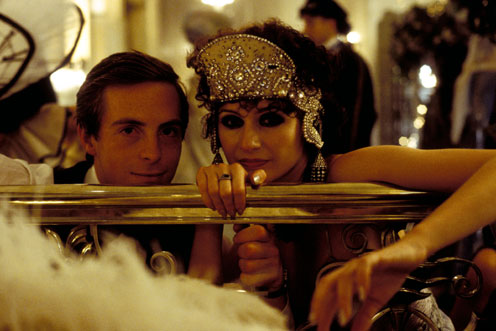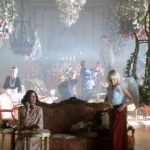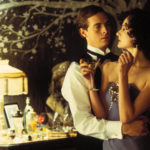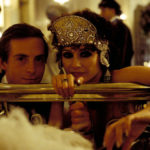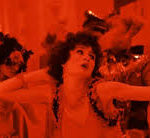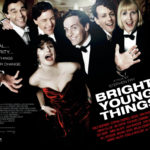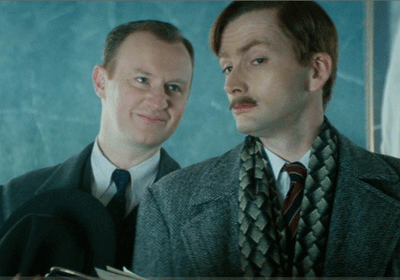Bright Young Things is Stephen Fry‘s 2003 star-studded film adaptation of Evelyn Waugh‘s 1930 satire on high society, Vile Bodies, and the original title of the novel eschewed by Waugh on the grounds that it had become a cliche in its own right.
But first a word about the plot of the book, to which the film stays loyal and which in turn might be seen as a British translation of the works of F Scott Fitzgerald (see The Great Gatsby, for example):
Adam Fenwick-Symes is the novel’s antihero; his quest to marry Nina parodies the conventions of romantic comedy, as the traditional foils and allies prove distracted and ineffectual. War looms, Adam’s circle of friends disintegrates, and Adam and Nina’s engagement founders. At the book’s end, we find Adam alone on an apocalyptic European battlefield. The book shifts in tone from light-hearted romp to bleak desolation (Waugh himself later attributed it to the breakdown of his first marriage halfway through the book’s composition). Others have defended the novel’s curious ending as a poetically just reversal of the conventions of comic romance.
This is stylish satire, maybe even a triumph of anarchic style over substance, complete with period soundtrack. It is done in such a way that you suspect Fry rather admires the affluent young pleasure seekers in spite of their typically vainglorious behaviour that leaves them doomed, as if they represented a wild fling in a brief moment before being engulfed by history. Fry has presumably having done a fair few wild parties in his own university years, though I suspect he has now outgrown them.
The sins of the spiffing young crowd include outraging the morality of the day (including that of the fictional Prime Minister Sir James Brown aka Bill Paterson), alcoholism, cocaine, bizarre sexuality (whisper it – this is long before 1967) and fates correspond: for example, being forced to flee the country, being committed to a mental institution, and fighting in the war, dash it all!
These characters are indeed characters in every sense of the word, recognisable stereotypes almost to a man and woman, such that each member of the cast slips comfortably into their guise as if it were a pair of old slippers. Their names tell you much about Waugh’s intentions: a paparazzo named Sneath, Lady Throbbing, Lord Monomark, Lady Metroland, Mrs Melrose Ape, Agatha Runcible, you get the picture – they reminded me strongly of the character names in Voltaire‘s Candide.
The film is studded with glorious cameos, such as Jim Broadbent‘s drunken but decently honest old major, who, in the height of the war becomes a drunken old general, but who keeps the bet into which he entered; there is Dan Ackroyd‘s newspaper proprietor Lord Monomark, every bit as fickle and fawning as Lord Copper in Scoop; what about Peter O’Toole‘s aristocratic eccentric, Col. Blount, whose daughter Nina anti-hero Adam Fenwick-Symes wishes to marry; Simon Callow‘s delightfully woeful ex-King of Anatolia.
Praise too for Stockard Channing‘s forthright moralist Mrs Ape, and, in his final role, Sir John Mills as an old-school gentleman sampling “naughty salt” for the first time. But my favourite cameo? Julia McKenzie as Symes’s landlady, Lottie Crump. All are larger than life, as you would expect of a satire.
In fact, wherever you look there are charming characterisations, jewels in the crown you might say – and trust me, there are plenty more faces you will recognise, and none will disappoint you. Even Fry himself gets a brief look-in, much as Hitchcock always did.
So to the leads. Most flamboyant must be a tie between Michael Sheen‘s outrageous Milo and Fenella Woolgar’s Agatha, but I like the contrast with Stephen Campbell Moore‘s Adam Fenwick-Symes, an earnest young man trying to get on and earn money to win over Emily Mortimer‘s Nina, but since the money is denied by circumstances she ends up being won over by David Tennant‘s rich but dour Scot, Ginger Littlejohn.
Like candy floss, the first two thirds of Bright Young Things is a trifle wrapped in rich, gaudy packaging. It is there to marvel at but is free from substance. The character and mood changes markedly, though by the end we have reached the land of happy endings and a reward for substance and loyalty. Huzzah!

